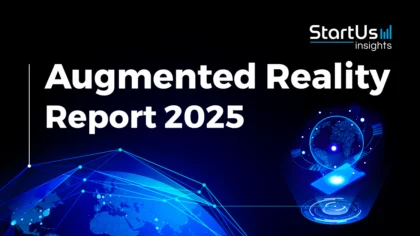Accelerate Productivity in 2025
Reignite Growth Despite the Global Slowdown
Advances in high-performance computing drive innovations in computational-intensive applications such as space launches, autonomous vehicles, and more. Conventional desktop computers and workstations are not capable of computing or analyzing large, complex data at high speeds. HPC enables advanced data analytics capabilities across industries, powering real-time process optimization, drug discovery, market forecasting, and more. This article provides an overview of the top 10 high-performance computing trends, including artificial intelligence (AI), cloud and edge computing, blockchain, and cybersecurity. Read more to discover the latest developments in high-performance computing and how they impact your business.
Innovation Map outlines the Top 10 High-Performance Computing Trends & 20 Promising Startups
For this in-depth research on the Top High-Performance Computing Trends & Startups, we analyzed a sample of 549 global startups & scaleups. The result of this research is data-driven innovation intelligence that improves strategic decision-making by giving you an overview of emerging technologies & startups advancing data processing. These insights are derived by working with our Big Data & Artificial Intelligence-powered StartUs Insights Discovery Platform, covering 2 500 000+ startups & scaleups globally. As the world’s largest resource for data on emerging companies, the SaaS platform enables you to identify relevant startups, emerging technologies & future industry trends quickly & exhaustively.
In the Innovation Map below, you get an overview of the Top 10 High-Performance Computing Trends & Innovations that impact 549 companies worldwide. Moreover, the High-Performance Computing Innovation Map reveals 20 hand-picked startups, all working on emerging technologies that advance their field.
Top 10 High-Performance Computing Trends
- Artificial Intelligence
- Cloud Computing
- Simulation & Digital Twins
- Scalable Computing
- Edge Computing
- Blockchains
- Quantum Computing
- Distributed Computing
- Cybersecurity
- Thermal Management
Tree Map reveals the Impact of the Top 10 High-Performance Computing Trends
Based on the High-Performance Computing Innovation Map, the Tree Map below illustrates the impact of the Top 10 High-Performance Computing Trends in 2023. AI addresses the challenges in rapid algorithm testing and validation with scalable and cloud computing expands computational capabilities while improving accessibility. Besides, innovations in blockchain and cybersecurity make data processing over HPC networks secure and traceable. Further, edge computing and digital twins enable simulations and analytics of more complex processes. Innovations in distributed computing are overcoming many of the limitations of HPC data centers while thermal management technologies are improving the carbon footprint of HPC. Lastly, quantum algorithms improve the performance of classical HPC systems by providing more efficient ways to solve specific problems.
Global Startup Heat Map covers 549 High-Performance Computing Startups & Scaleups
The Global Startup Heat Map below highlights the global distribution of the 549 exemplary startups & scaleups that we analyzed for this research. Created through the StartUs Insights Discovery Platform, the Heat Map reveals that the US sees the most startup activity, followed by Western Europe.
Below, you get to meet 16 out of these 549 promising startups & scaleups as well as the solutions they develop. These high-performance computing startups are hand-picked based on criteria such as founding year, location, funding raised, & more. Depending on your specific needs, your top picks might look entirely different.
Top 10 High-Performance Computing Trends in 2023
1. Artificial Intelligence
The scale and complexity of data processing in high-performance computing require a significant time investment to train, build, and validate models. AI algorithms optimize the performance of HPC systems by enabling them to learn from data and make accurate predictions to improve their efficiency. For example, AI-powered algorithms train on data from HPC systems to identify patterns and trends to optimize resource allocation, boosting performance. Additionally, AI enables the development of new algorithms and software for HPC systems that specializes in solving complex problems.
HPC-AI Technology accelerates Deep Learning Model Training
Singaporean startup HPC-AI Technology develops a cloud-based software platform for model development using high-performance computing. The platform contains features for efficient memory management and dynamic scheduling as well as supports data, pipeline, sequence, and tensor parallelism. Besides, it distributes training and inference of large neural networks across multi-host architectures. This maximizes runtime performance for large-scale training on single or multiple central, tensor, and graphics processing units. The startup’s AI-based open-source code enables companies to integrate HPC to significantly lowers costs in applications like medical research and financial forecasting.
Ceremorphic enables Energy-Efficient AI Supercomputing
US-based startup Ceremorphic manufactures ultra-low-power supercomputing chips to address HPC requirements. The startup’s processor contains proprietary multi-threaded processing, ThreadArch, with quantum-resistant security and uses a 5nm production process. It reduces the growing energy consumption in applications such as AI model training, drug discovery, metaverse processing, and more.
2. Cloud Computing
High-performance computing systems are expensive and require additional infrastructure to provide sufficient electricity and cooling. This makes HPC infrastructures expensive and inaccessible. Cloud computing overcomes this and provides businesses access to a wide range of computing resources on-demand and over the internet. HPC solutions available on demand include processors, memory, and storage. Moreover, it provides easy access to otherwise inaccessible specialized resources such as flagship GPUs, quantum processors, or other specialized hardware.
Nebula Cloud advances Intelligent Cloud Computing
US-based startup Nebula Cloud develops a fully-managed HPC platform to automate and optimize engineering workloads. The platform’s features include multi-cloud optimization, enhanced monitoring, automatic scaling, zero trust security, and advanced orchestration. This enables developers and engineers to deploy scalable, reliable, and highly available environments for end-to-end applications.
Tingyu provides Low-latency Container Services
Tungyu is a Chinese startup that specializes in edge and cloud-based high-performance computing for low-latency applications. The startup’s low-latency edge container-as-a-service solution is built on massive edge computing nodes and provides common container capabilities such as orchestration and deployment. Additionally, it features elasticity through hour-level usage and billing with real-time monitoring of service status. Tingyu’s solution thus allows video distribution services to leverage low-latency live broadcasts and on-demand capabilities, enabling interactive viewing experiences.
3. Simulation & Digital Twins
One of the biggest problems with digital twins is the complexity and scale of the simulations and models required to represent real-world systems. They are complex and data-intensive and need significant computational power to run. High-performance computing solves this problem by providing powerful and efficient computing resources that support demanding workloads. Consequently, it expands the use cases of simulation and digital twins while improving their accuracy. For example, HPC systems provide the computational power to model factories and supply chains to recreate production processes within a single virtual environment.
Collimator specializes in Cloud-based Simulation
Collimator is a US-based startup that makes modeling and simulation software using cloud-based high-performance computing. The software allows engineers to perform simulations in the cloud without provisioning HPC servers or managing cloud providers. It also runs large-scale simulations like Monte Carlo simulations, MIL SIL and HIL testing, and parameter optimization, as well as supports multiple simulations in parallel. This way, the software allows design engineers to perform end-to-end testing and validation at massive scales without substantial expenditure on on-premises hardware.
BosonQ Psi creates Quantum Computing-powered Simulations
Indian startup BosonQ Psi creates BQPhy, modeling software that uses quantum computing and multiphysics simulations. The quantum-powered engineering simulation software lets engineers conduct design exploration studies. It computes and models deformations, stress, and strains in solid materials and temperature variations through all the modes of heat transfer. Moreover, the modeling software enables engineering teams to perform acoustic, electrochemical, fluid analyses, and more with accurate digital twins.
4. Scalable Computing
Scalability is essential in high-performance computing as it allows such systems to handle large and complex workloads and adapt to changing requirements. While HPC systems enable high-speed processing of workload, they are unable to handle workloads beyond their initial scope. At the same time, scalable HPC systems easily expand or contract their capacity to meet the needs of particular workloads without disrupting throughput. HPC systems with scalable architecture enable applications such as aerospace air flow simulation, financial market forecasting, and more.
Ctrl IQ manages Massive Cluster Computers
Ctrl IQ is a US-based startup that develops Warewulf, a platform that combines hyper-scalability, cloud, and HPC through orchestration. It is a cluster management and provisioning platform that simplifies the process of acquiring, securing, and deploying resources from small researcher-run clusters to large HPC clusters. Moreover, Warewulf is able to scale up and down to easily deploy, administer, debug, and secure any clustering environment, reducing the burden on systems administrators.
Cluster Power offers a Large Data Deployment Smart Cloud
Cluster Power is a Romanian startup that specializes in scalable and reliable computing and data storage. The startup’s solution, ClusterPower Computing, enables compute-intensive processes, analytics, and large-scale application programs to run efficiently through high-performance cloud computing. Additionally, its storage solution, ClusterPower Cloud Storage as a Service, provides scalable, secure, enterprise-grade network file systems. It assists in heavy workloads with data management, high data protection, data sharing functions, and common data management.

5. Edge Computing
The massive size of data sets in high-performance computing applications increases network latency, the risk of data theft, and more. Edge computing brings computation closer to data sources, allowing HPC systems to process data locally. For instance, this enables healthcare organizations to develop new treatments and therapies and improve medical diagnostics without sending patient data outside hospital networks or premises.
Cornelis Networks advances Emergency Responder Communication
US-based startup Cornelius Networks creates high-performance fabrics that accelerate computing workloads. The startup’s product, OMNI-PATH EXPRESS EDGE SWITCH, uses an OpenFabrics Interfaces (OFI) framework that delivers super-low latency and high message rates with ultra-low CPU utilization. It also ensures high network efficiency and security through dynamic adaptive routing, congestion control, packet integrity protection, and traffic flow optimization. The startup’s solution finds applications in computational fluid dynamics, computational chemistry, molecular dynamics, and more.
Firmus develops a Modular AI factory
Tasmanian startup Firmus makes Cube 300, a sustainable and scalable immersion-cooled data center platform. It utilizes NVIDIA’s deep learning GPUs and AI network fabric to provide a sustainable, lower-cost AI computational cloud. The platform also retrofits to upgrade existing core and shell spaces. Moreover, it hosts up to 130kW per 42RU with full-stack metal orchestration through its Supercloud, enabling various edge computing uses.
6. Blockchains
Blockchain networks rely on a distributed network of computers, known as miners, to validate and add new transactions to the blockchain. As more transactions are added to blockchains, they require increasingly more computational power. Blockchains with high transactions also stress networks, limiting their ability to support high volumes of users or applications. HPC systems offer the necessary computational power needed to run the algorithms and logic required by blockchain smart contracts. This enables governments and businesses to securely share data while ensuring real-time data processing.
Inspire Semiconductor advances Blockchain Acceleration
US-based startup Inspire Semiconductor specializes in developing high-performance computing, AI, and blockchain accelerators. The startup’s supercomputer cluster-on-a-chip accelerator architecture, Thunderbird, features an array of thousands of efficient, and powerful 64-bit CPU cores. They are tightly integrated with high-speed memory and networking. Moreover, the accelerator optimizes blockchain operation with an extreme-bandwidth, low-latency on-chip mesh network fabric for both inter- and intra-chip connectivity. This dedicated acceleration for blockchain algorithms improves speed and energy efficiency while keeping costs economical.
Cudos creates a Decentralized Cloud Computing Network
Cudos is a UK-based startup that provides a blockchain platform using a decentralized cloud computing network. Its Layer 1 network, Cudos Network, offers scalable distributed computing direct to smart contracts or to any bridged blockchain. Moreover, the platform enables cost-effective and sustainable computing by connecting blockchain developers and services to a global pool of computing power. Cudos’s other product, Cudos Bridge, supports the migration or bridging of holdings between Ethereum and the startup’s blockchains. Through these solutions, Cudos enables development in the metaverse, dynamic non-fungible tokens (NFTs), decentralized finance (DeFi), and more.
7. Quantum Computing
Quantum computers use quantum bits, or qubits, instead of classical bits to represent and manipulate data. This makes building and maintaining quantum computers challenging as qubits are fragile and easily disrupted by external factors, such as temperature or electromagnetic radiation. HPC systems are able to develop and test new algorithms and applications for quantum computers or simulate and analyze the behavior of quantum systems. Advances in quantum computers further enable HPC systems that solve various issues. The applications of this technology include cryptography, business optimization, and advanced research.
QM Ware provides a Hybrid Quantum Cloud
Swiss startup QM Ware creates hybrid quantum computing systems for private clouds. The startup’s simulator allows businesses and developers to test hypotheses, ideas, and algorithms and also provides interface and software support for running codes. It serves as a benchmarking tool and estimates the effectiveness of current HPC devices such as superconducting-based or ion-based qubit registers. The startup’s simulator thus allows companies to run mission-critical simulations for applications in finance, logistics, and medical industries.
Nord Quantique develops Error-correcting Quantum Processors
Nord Quantique is a Canadian startup that develops error-correcting quantum processors to mitigate errors on individual qubits. The startup implements bosonic codes with superconducting circuits to provide a richer encoding space. This prevents noisy interactions that impact the system and produce errors, thus preserving quantum information. The startup’s superconducting circuits provide a complete toolbox for engineering high-performance bosonic codes while addressing the issue of noise on chips.
8. Distributed Computing
Supercomputers and high-performance computing systems power resource-intensive applications such as DNA modeling, video rendering, AI development, and so on. To handle these tasks, HPC data centers need high capital and operating costs to build and maintain such HPC systems. Distributed computing solves cost and reliability challenges by connecting computers through the internet to pool their computing resources. Moreover, distributed computing improves load balancing and fault tolerance as well as enables decentralized computing.
Flux Network offers Distributed Cloud-based Supercomputing
Canadian startup Flux Network makes a distributed cloud-based supercomputing system that uses peer-to-peer (P2P) networking. The startup’s solution, Flux Ecosystem, allows users to connect their smartphones, tablet, laptops, and gaming systems to its network and pools excess processing power. Flux’s solution also utilizes machine learning to optimize computing resources and divide tasks among users. Besides, Flux Network encourages users to join and build larger resource pools by providing monetary incentives.
LongDB Technology specializes in Hybrid Transaction & Analytical Processing
Chinese startup LongDB Technology develops an enterprise data platform that integrates a distributed hybrid transaction and analytical processing (HTAP) engine. The startup’s distributed relational database intelligently determines access paths, execution strategies, and parallel algorithms based on incoming workloads. Moreover, the scalable distributed architecture of the cluster enables the engine to scale from a few nodes to thousands of nodes to handle data services.
9. Cybersecurity
The rising volume and complexity of cyber threats, such as malware and ransomware, increase interest in cybersecurity across industries. These threats have a significant impact on the security and integrity of information systems and pose a risk to organizations and individuals. HPC alleviates this problem by providing powerful and efficient computing resources that support the research and development of cybersecurity solutions. For example, HPC systems enable security companies to develop and test new algorithms and technologies for detecting and preventing cyber threats. They also analyze large volumes of data to identify patterns and trends that indicate the presence of cyber threats.
Patero offers a Hybrid Post-Quantum Cryptomodule
Patero is a US-based startup that develops a software-based crypto module that combines traditional and quantum-resistant algorithms to protect critical communications. It features enhanced compliance and security by using certified algorithms and NIST-qualified post-quantum candidates. Besides, the software is easily deployable in various system architectures including bare metal, cloud, and edge environments. Patero’s cryptographic cybersecurity solution enables telecom providers to protect their customer data and banks to secure digital transactions.
QuantLR delivers Quantum Encryption
QuantLR is an Israeli startup that specializes in quantum cryptography-based cybersecurity. The startup’s plug-and-play quantum cryptography solution uses existing hardware components to reduce costs and enable mass deployment. Additionally, it also securely transfers keys in networks, detects and prevents eavesdropping, and negates man-in-the-middle attacks. The startup’s quantum encryption finds applications in a wide range of industries including finance, critical infrastructure, and telecom.
10. Thermal Management
Modern CPUs and GPUs are capable of processing enormous workloads in real time, but they require immense power and cooling. Moreover, air cooling requires multiple high-speed and loud fans while water cooling requires extensive hardware modifications. For these reasons, startups are developing cooling technologies such as immersion cooling and memes-based cooling pads. They make cooling high-performance computers simple and effective as well as mitigate in-house product development.
Refroid advances Immersion Cooling
Indian startup Refroid provides immersion cooling solutions for mission-critical computing applications. The startup’s products include an immersion cooler that dissipates up to 50kW of heat, EcoPod 24, and another cooler with up to 200kW heat dissipation in a 42U format, EcoPod 42. Besides, Refroid provides plug-and-play, rapidly deployable solutions in a box for offices with on-premise data centers and containerized cooling. The startup’s immersion cooling solutions enable data centers to reduce their carbon footprint while improving the life of HPC hardware.
Corintis develops Silicon Microfluidic Cooling
Swiss startup Corintis makes a silicon microfluidic cooling solution that enables very low operating temperatures in high-density and vertically integrated circuit designs. The startup’s technology features a monolithic, three-dimensional network of microscopic channels. These channels support 2 000 W/cm of heat extraction, extremely low-pressure drop, and reduced coolant consumption. Corintis’s solution thus avoids the inefficiency of heat transfer due to multiple material layers in traditional air or liquid-cooled systems.
Discover all High-Performance Computing Trends, Technologies & Startups
Scalable high-performance computing is gaining importance as the amount of data generation keeps increasing. AI and cloud computing are essentially reducing the complexity of HPC systems and making them more accessible for a wider range of applications. Moreover, cloud-based high-performance computers power digital twins and modeling solutions that optimize operations across industries. Advances in low-latent connectivity and quantum computing will improve the performance of HPC systems.
The High-Performance Computing Trends & Startups outlined in this report only scratch the surface of trends that we identified during our data-driven innovation & startup scouting process. Among others, quantum computing, 5G, and edge computing will transform the sector as we know it today. Identifying new opportunities & emerging technologies to implement into your business goes a long way in gaining a competitive advantage. Get in touch to easily & exhaustively scout startups, technologies & trends that matter to you!
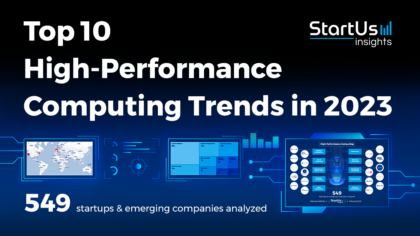
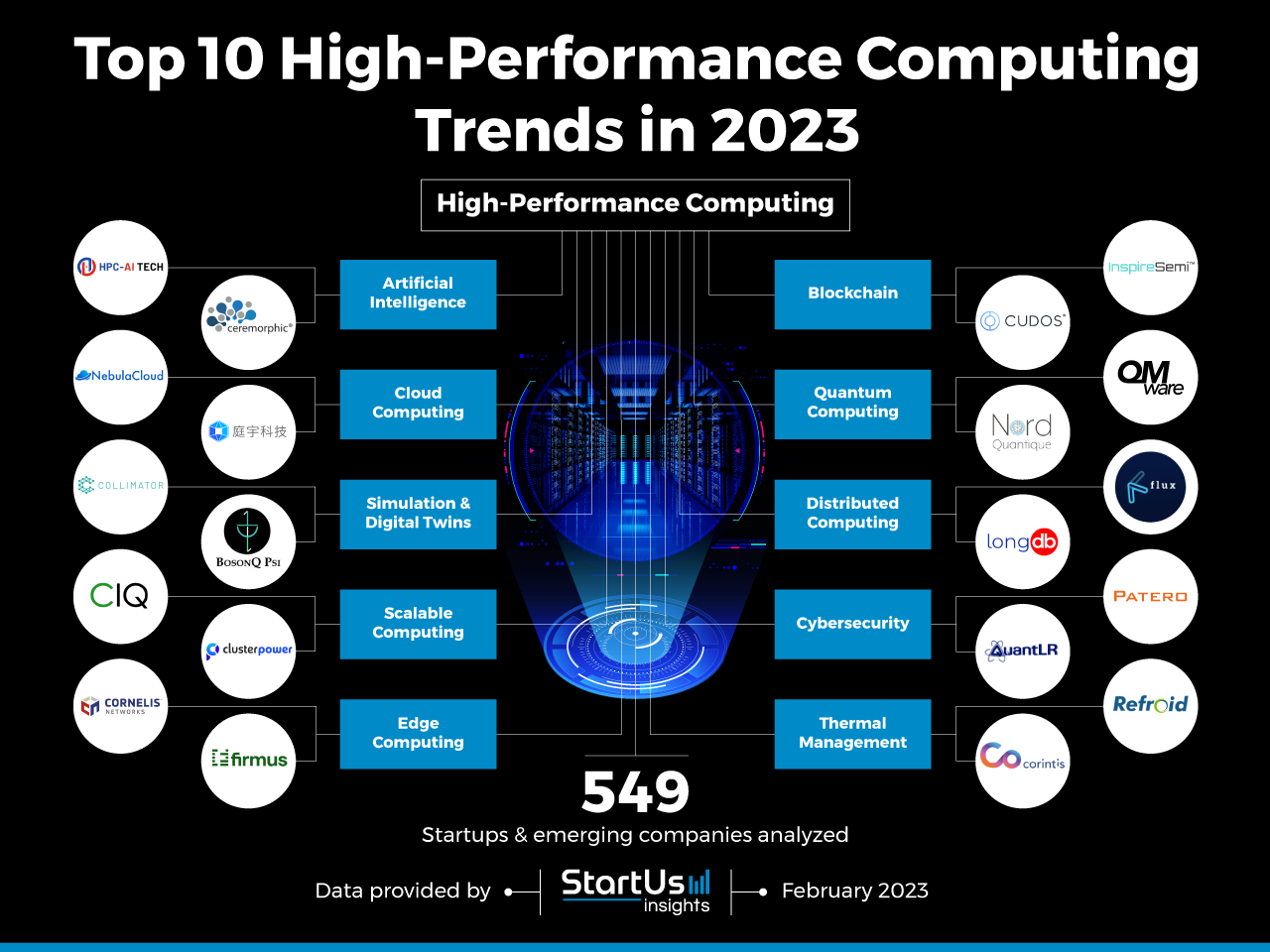
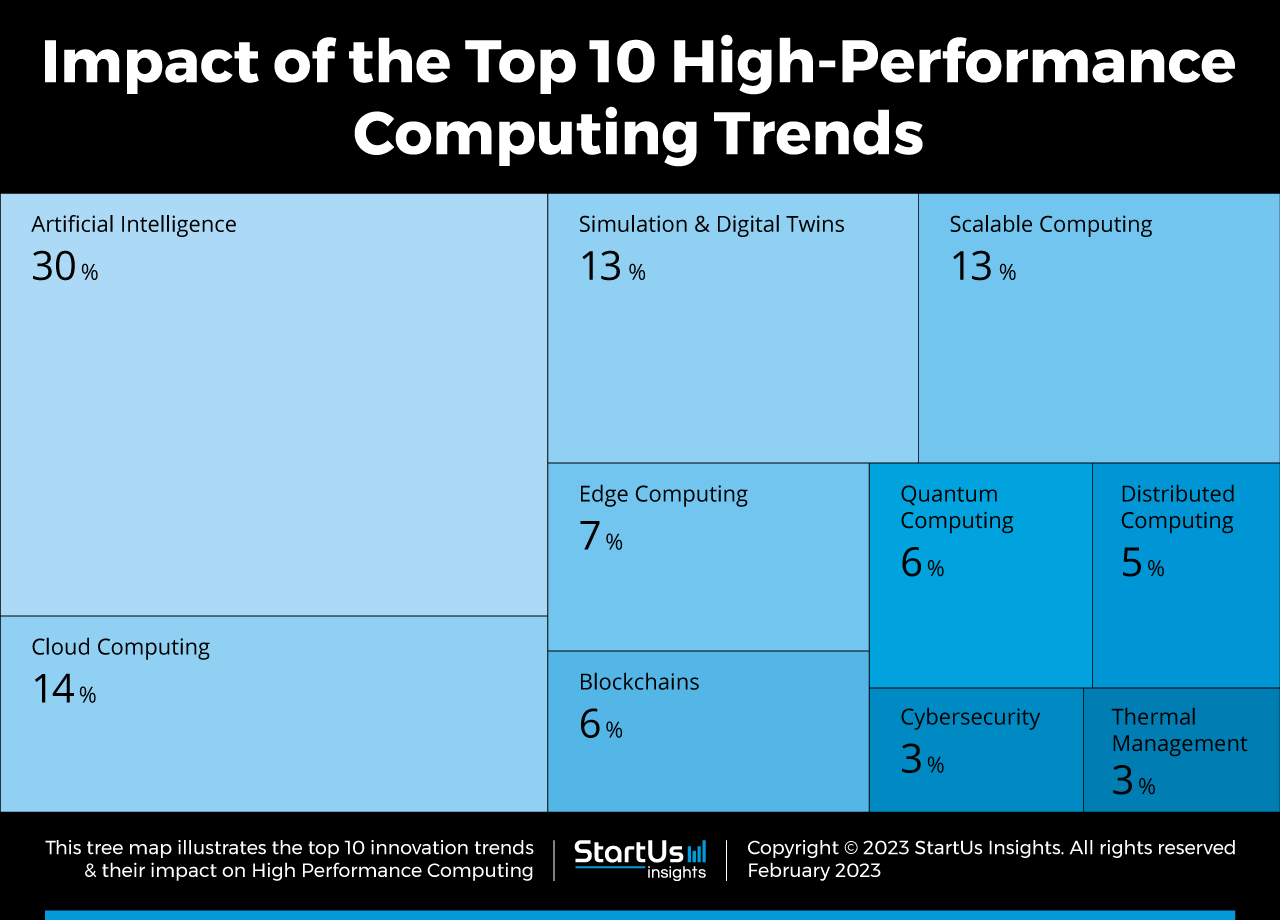
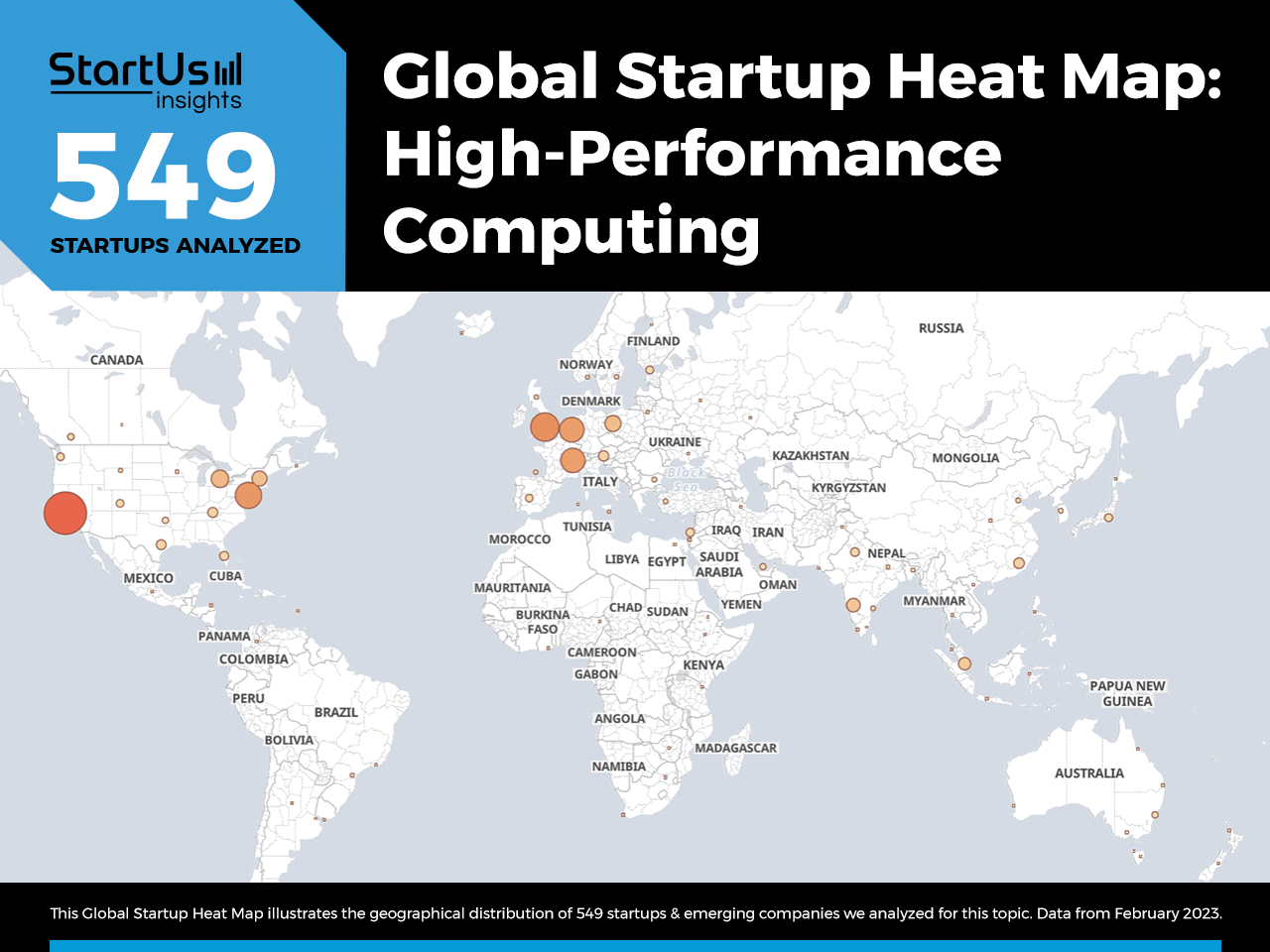
![10 Top Digital Twin Startups and Companies for Industry 4.0 [2025]](https://www.startus-insights.com/wp-content/uploads/2025/06/Digital-Twin-Startups-for-Industry-4.0-SharedImg-StartUs-Insights-noresize-420x236.webp)
